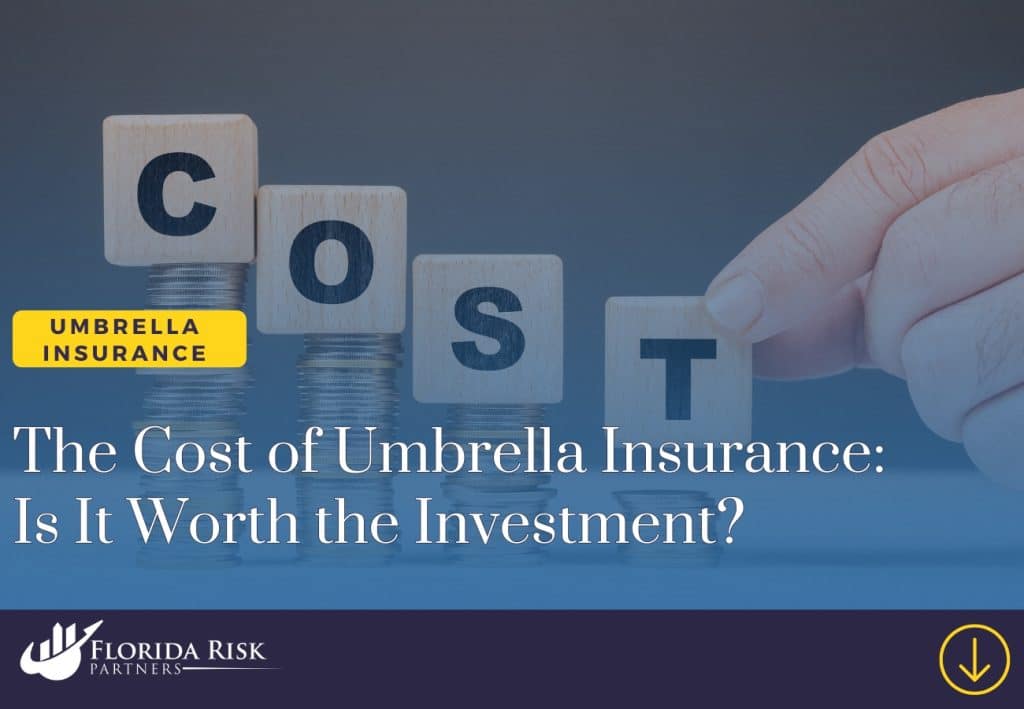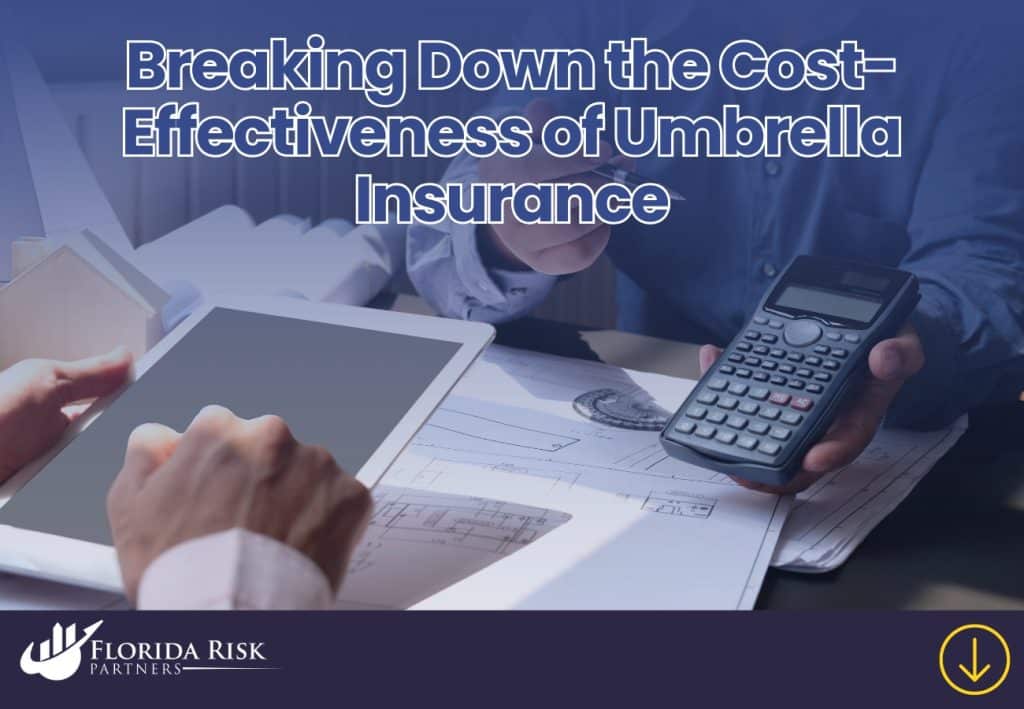-
Main Office: 1434 E. Bloomingdale Ave Valrico, FL 33596-6110
-
Phone: (888) 601-6660
-
Email: info@floridariskpartners.com

Many people understand the benefits of personal umbrella insurance but hesitate to add it to their insurance portfolio due to cost concerns. When considering any form of insurance, affordability and value are key factors. Umbrella insurance is designed to provide an extra layer of liability protection that goes beyond the limits of standard homeowners, auto, or renters policies. But how much does umbrella insurance actually cost, and is it worth the investment?
In this post, we’ll break down the costs associated with umbrella insurance, factors that influence your premium, and the value it brings in relation to the financial risks it protects against. By the end, you’ll have a clear understanding of why umbrella insurance is one of the most cost-effective ways to protect your assets and future income.
What is Personal Umbrella Insurance?
Umbrella insurance is a type of liability insurance that sits on top of your existing policies, providing extra coverage in the event of a large claim or lawsuit. It kicks in when the liability limits of your primary insurance policies, like homeowners or auto insurance, are exhausted. Umbrella insurance not only extends your coverage limits but also provides protection for certain types of claims that primary policies don’t cover, such as personal injury lawsuits for slander, libel, or defamation.
Most umbrella policies start with a coverage limit of $1 million, with additional increments available. The premiums are relatively low compared to the level of coverage provided, which is why umbrella insurance is often considered a cost-effective way to secure financial protection.
Understanding the Cost of Umbrella Insurance
The cost of umbrella insurance is surprisingly affordable for the amount of protection it provides. For a $1 million policy, the annual premium typically ranges from $150 to $300. Each additional $1 million in coverage generally costs an extra $75 to $100 per year. So, for $2 million in coverage, you might expect to pay between $225 and $400 annually, and for $5 million, between $375 and $600 per year.
Factors That Influence Umbrella Insurance Premiums
While umbrella insurance is generally affordable, certain factors can influence the cost of your policy. Here’s an overview of the primary factors that affect umbrella insurance premiums:
- Coverage Limits: The more coverage you need, the higher your premium will be. While $1 million is the starting point for most umbrella policies, those with high-net-worth individuals or substantial assets may opt for $5 million, $10 million, or more.
- Underlying Policy Limits: Insurance providers typically require that you carry a minimum amount of liability coverage on your primary policies (such as homeowners or auto insurance) before they issue an umbrella policy. If you need to increase your primary coverage limits to meet these requirements, your total insurance costs may increase.
- Personal Risk Factors: Certain factors, like your driving record, property features (e.g., swimming pools or trampolines), and pets, can impact your umbrella insurance premium. Higher-risk factors may lead to higher premiums, as they increase the likelihood of a liability claim.
- Number of Properties and Vehicles: Owning multiple properties or vehicles, including recreational vehicles like boats or ATVs, can increase your liability exposure, which in turn can raise your umbrella insurance premium.
- Location: Where you live can also influence your premium. Areas with higher rates of lawsuits or higher liability risk (such as large urban centers) may have higher premiums.
- Household Drivers: If you have teenagers or other high-risk drivers in your household, this could impact your premium. Teen drivers have higher accident rates, which increases the likelihood of a large claim.
Understanding these factors can help you estimate your umbrella insurance costs more accurately and make adjustments to your coverage if necessary.
Breaking Down the Cost-Effectiveness of Umbrella Insurance

While no one wants to pay more for insurance than necessary, umbrella insurance is unique in that it provides significant financial protection for a relatively low premium. Here are a few ways to think about the cost-effectiveness of umbrella insurance:
1. High Coverage Limits at Low Premiums
Compared to other types of insurance, umbrella policies provide substantial coverage at a low cost. For example, a $1 million umbrella policy typically costs less than a daily cup of coffee. This low premium provides you with an extensive layer of protection that safeguards your assets and future income from major claims.
2. Cost-Benefit of Protecting Your Assets
If you have significant assets, such as a home, savings, or investments, umbrella insurance ensures you don’t have to liquidate these assets to pay for a large claim or lawsuit. The cost of the annual premium is minimal compared to the financial risk of losing hundreds of thousands or even millions of dollars in assets in the event of a major lawsuit.
Example: Let’s say you own a home, have a retirement fund, and hold valuable investments totaling $800,000. For a few hundred dollars a year, umbrella insurance can protect these assets from being at risk in a large liability claim, making it a worthwhile investment.
3. Protection Against Wage Garnishment
For individuals with high earning potential, umbrella insurance is an effective way to protect future income. If you’re sued for an amount that exceeds your primary insurance limits, a judgment could lead to wage garnishment, impacting your future financial goals. Umbrella insurance shields you from this risk, allowing you to protect your income and financial stability.
4. Legal Defense Costs Coverage
Legal defense costs can be significant, even if a claim against you is ultimately dismissed. Many people don’t realize that umbrella insurance covers legal defense fees, court costs, and other related expenses, whether or not you’re found liable. The legal costs alone in a lawsuit can far exceed the annual premium of an umbrella policy, making it a cost-effective way to cover potential legal expenses.
Example: If someone sues you for $500,000 due to a personal injury claim, your umbrella insurance would cover both the settlement costs and legal fees, preventing you from facing a substantial financial burden.
5. Coverage for Personal Injury Claims Not Covered by Primary Policies
Homeowners and auto insurance rarely cover claims like slander, libel, or invasion of privacy. Umbrella insurance fills this gap, shielding you from costly non-physical injury lawsuits. If you’re active on social media, in a high-profile profession, or frequently interact with the public, this protection is invaluable.
Is Umbrella Insurance Worth It?
To determine if umbrella insurance is worth the investment, it’s helpful to weigh the premium cost against the potential financial risk of not having it. Here are some questions to help you evaluate its value:
Do You Have Significant Assets to Protect?

The primary purpose of umbrella insurance is to protect your assets. If you have a substantial amount of wealth or property, umbrella insurance offers a level of protection that keeps these assets secure. For those with considerable net worth, the cost of a lawsuit that exceeds their primary policy limits could be financially devastating without umbrella coverage.
Are You at a High Risk of Being Sued?
Certain factors increase your liability risk, such as owning rental properties, having teenage drivers, hosting frequent social gatherings, or participating in high-risk activities like boating. If any of these apply to you, umbrella insurance can help mitigate the risk of facing a large claim or lawsuit.
Do You Have Future Earning Potential to Protect?
For individuals with a high earning potential, the financial protection umbrella insurance provides can be particularly valuable. If a court judgment leads to wage garnishment, it could impact your long-term earning ability and financial stability. Umbrella insurance provides peace of mind, ensuring that your future income remains secure.
Do You Understand the Limitations of Your Primary Policies?
Many people assume their primary policies offer more protection than they actually do. Homeowners, auto, and renters policies have liability limits, and these limits are often much lower than what might be required in a large claim. Umbrella insurance fills the gap, extending your liability coverage and providing extra security when primary policies fall short.
Real-Life Scenarios That Illustrate the Value of Umbrella Insurance
Let’s look at some real-life scenarios where the cost-effectiveness of umbrella insurance is apparent.
Scenario 1: Multi-Vehicle Car Accident
Imagine you’re involved in a multi-car accident where you’re found to be at fault. The total medical expenses, property damage, and potential legal fees amount to $1.2 million. If your auto insurance liability limit is $300,000, you’d be responsible for the remaining $900,000. For just a few hundred dollars a year, umbrella insurance would cover the additional amount, saving you from financial devastation.
Scenario 2: Injury on Rental Property
If you own a rental property, a tenant or their guest could be injured on your property. Suppose a tenant’s guest falls down a staircase and files a lawsuit, resulting in $600,000 in damages. If your landlord insurance covers $250,000, you’d be left with $350,000 in uncovered expenses. With umbrella insurance, the additional amount would be covered, providing peace of mind and protecting your investment.
Scenario 3: Defamation Lawsuit
Suppose you’re active on social media and make a comment that unintentionally harms someone’s reputation. The individual sues you for defamation, and legal fees and settlements reach $400,000. Standard homeowners insurance doesn’t cover this type of claim, but umbrella insurance does. By covering the legal fees and settlement, umbrella insurance protects you from a significant financial hit.
The Bottom Line: Why Umbrella Insurance is a Smart Investment
In today’s litigious world, umbrella insurance offers vital protection for your assets and financial future. With affordable premiums, it ensures you’re not financially exposed to large claims or lawsuits. Whether you have significant assets, high earning potential, or seek peace of mind, umbrella insurance is a smart addition to your portfolio.
If you’d like to learn more about how umbrella insurance can protect you, download our free e-book for a comprehensive guide to umbrella insurance, including scenarios, coverage details, and expert insights.
By investing in umbrella insurance, you’re taking an important step to secure your financial stability, protect your assets, and enjoy peace of mind knowing you’re covered in a wide range of scenarios.
Call Us Or
Schedule an Appointment
Select an agent below to view our online calendars and select a day and time that works best for you or call us directly at 888-601-6660. When you use our online calendars, you will receive an email with more information.



